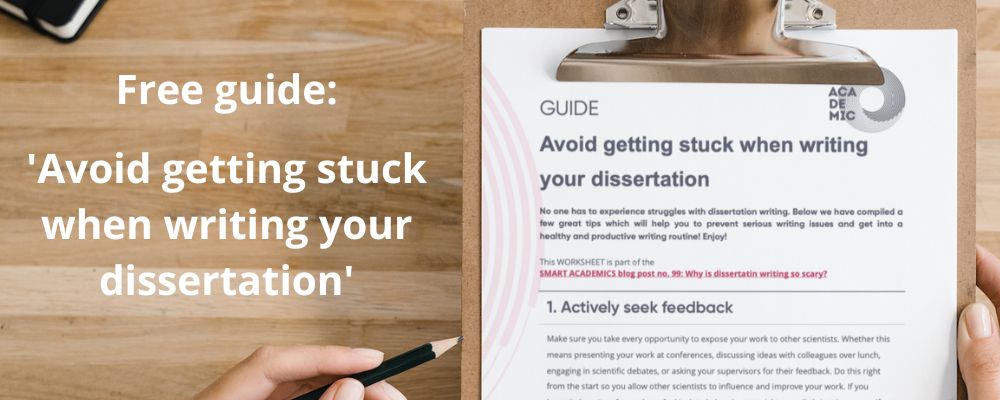Are you experiencing writing problems? Feeling uncomfortable when thinking about dissertation writing? Don’t let the mild symptoms of writing anxiety turn into something bigger! What might start as just low motivation can soon lead to getting stuck in the writing process and delaying completion of your thesis. In this blogpost, we dig deep into the reasons why most PhD candidates are scared of dissertation writing, and let you know what you can do to avoid getting stuck altogether! Hint: It is totally avoidable.
We know that many of you wrestle with the act of writing your thesis. Rest assured, you are not the only one. Here’s the example of Callum, one of our recent PhD Success Lab participants:
Callum was in the 4th and final year of his PhD, and had experienced writing problems throughout the process. For him, writing was associated with hours of unhappiness. Before he started a writing task, he already knew that it would be difficult and take so long. He was disappointed about his obvious inability, and was hardly ever satisfied with the outcome. In his final year, his writing problems exacerbated and progress on his thesis came to a grinding halt. He started to doubt whether he would be able to complete his dissertation.
Anxieties in the dissertation writing process can go unacknowledged for a long time. What might start as just low motivation, or an attitude of ‘I don’t like writing,’ eventually turns into something bigger. At the beginning of a PhD, the pressure to write is still relatively low, but usually increases as you have to produce the papers for the cumulative dissertation, or you realise that you need to write 100+ pages for your monograph. Add the looming deadline of the hand-in date (aka: end of contract) and you have the perfect breeding ground for getting stuck in the writing process.
Fear can turn the dissertation writing process into a challenging and painful experience, and slow down your progress overall. In serious instances, it can delay your PhD completion for months, or even prevent you from handing-in altogether.
But getting stuck with dissertation writing is totally and utterly avoidable! In this blogpost, we discuss common reasons why PhD candidates get stuck in the writing process and in our free guide ‘Avoid getting stuck when writing your dissertation’, we share our advice on how you can avoid getting into trouble and have a smooth ride to the end.

Quick check: How do you feel about thesis writing?
Your emotional response when thinking about upcoming writing tasks in your PhD can give you a first indication of whether you might be at risk of developing writing anxieties or not.
Close your eyes and envision an upcoming writing task. What do you feel?
- joy & excitement: you think ‘nice, I look forward to it, bring it on’. Your emotional response is a positive one.
- indifference: you think ‘yeah, well, it’s just another task, I think I can get it done’ or ‘I don’t particularly like it, but it’s part of the job’. Your emotional response is a neutral one.
- stressed, uncomfortable, panicky, worried, nervous or terrified: you think ‘oh boy, if only I could get around this’ or ‘I’ll never get this done’ or ‘I hate writing’. Your emotional response is a negative one.
If your reaction is a negative or neutral one, you should think about addressing your writing issues so it does not turn into a fully fledged writing anxiety.
Not sure how to get started? See some of our most helpful blogposts on the topic below:
- #5: How to get started with writing papers?
- #36: 5 tips to get a paper accepted this year
- #49: 15 steps to get a paper written during the Corona lockdown
- #56: Breaking these 5 habits will speed up your thesis writing!

Reasons to get stuck when writing your dissertation:
1. Fear of what others will think of you and your work
Writing makes clear what you did and how this relates to the existing body of knowledge in your discipline. You will be up for scrutiny whenever you show a draft or publication, or parts of your dissertation to anyone else: Supervisors, peer-reviewers, examiners, etc. They will – and must – judge you and your work. Although part of the educational process, fear of feedback and criticism is very common among PhD candidates. That kind of fear typically leads to an avoidance-habit. The bigger the fear, the more one tends to avoid getting feed-back. But the less you show off your work, the more isolated you will be, and the bigger your fear will grow. You get stuck.
2. Fear of a fixed outcome
When you write up parts of your research and results for your dissertation, you ultimately fix the outcome of many months or years of work. There’s a zone of transition between your raw data on the one side and the story you tell in a paper or your dissertation on the other. When you write up your results, you have to decide how to present them, and which narrative to choose. Once that’s fixed, there’s no way back. That change can be quite scary, and you might (rightfully or not) be afraid that shortcomings or limitations will be revealed.

3. Underdeveloped writing skills
For the past few years, you’ve focused on your research, and spent much time honing your skills where necessary: from generating data to computing, analysing, experimenting, and observing. You mastered that, but you have not developed your writing skills to the same degree.
What might have been sufficient for essay-writing or the Bachelor work during your studies won’t cut it on the level of the PhD thesis. Writing peer-reviewed journal articles is such a highly specialised genre that it needs dedicated training to bring it up to a level where you can pass the peer-review process regularly without major hiccups. Likewise, writing an entire dissertation is an endeavour that needs a high level of skills which most people can’t master without support and practice.
Once you realise you have a problem with writing, you get less and less motivated to work on your dissertation – and hence, become afraid you won’t be able to finish your dissertation. Our SMART ACADEMICS blogposts #61: Ten hacks to quick-start your thesis writing! and #63: Train your writing muscle: Achieve better results are great starting points.
4. Disappointed by initial writing attempts
You started out on a positive note, you wrote a bit here and there, starting one paper or drafting your literature review. Initially you worked on it with a neutral mindset, but you soon were disappointed by the outcome: it took too long, you were staring at a blank page, you had difficulties organising your thoughts, or what you wrote didn’t make sense (to you). Multiple failed attempts left you disappointed. You are ashamed that a seemingly straightforward task like writing is difficult for you. Your inner voice says, ’I am no good, I can’t even write up my own results.’ You don’t know what went wrong, nor how to change it. But you’re afraid it’ll get worse next time you try.
See our SMART ACADEMICS blog post #54: 5 warning signs that indicate you should change the way you write papers .
5. Overwhelmed by the magnitude of the task
When you think about dissertation writing, you always have this huge intimidating outcome in mind. Your typical self-talk goes like this: ‘I have to write an entire dissertation with 100-200 pages of highly relevant, innovative content.’ It’s like standing at the foot of Mount Everest, peering at the top, knees shaking and asking yourself how on earth you’ll ever get up there. The sheer magnitude of the task takes the upper hand and freezes you in place.
Of course, it’s not only writing that may feel overwhelming, but other PhD tasks as well. See our SMART ACADEMICS blog post #59: strategies for how to get to get out of overwhelm.
6. Expectations too high
You have high expectations for how your dissertation or the papers for your dissertation should look. But the drafts you’ve prepared seem dull, and are lightyears away from what you envision as the end-product. You keep editing, revising and refining, and you go in circles. You realise that what you’ve produced is a far cry from the expected outcome, both in terms of quantity as well as quality. You feel stuck in a never ending loop or disappointment.
Often, the above mentioned writing anxieties join forces and appear in combination, which doesn’t make it any easier for you to pin-point the problem, find a solution, and move on. But whether you only have minor issues with dissertation writing, or you are seriously stuck, there is always a solution. We’ve summarised a few great tips in our free guide: Avoid getting stuck when writing your dissertation.

Overcome your problems and move on
Callum realised that his writing problems were serious and that he needed help. Joining the community of PhD students in PhD Success Lab made him realise that he was far from the only one who got stuck in the writing process. That alone was a relief and an eye-opener. He stopped seeing himself as a failure, and discovered that there were more technical issues behind his writing problems. In our course, he received clear instructions on how to improve his writing skills and set up a regular writing routine, which helped him gain more practice and make progress again. The knot was untied! Ultimately, this increased his confidence and boosted his motivation to finish the dissertation. Now he knew he would make it. A year after joining the PhD Success Lab, Callum has handed-in his dissertation. He managed to overcome his writing problems, and so can you!

Related resources:
- blog post #5 How to get started with writing papers?
- blog post #36: 5 tips to get a paper accepted this year
- blog post #47: Plan your project – save your PhD!
- blog post #49: 15 steps to get a paper written during the Corona lockdown
- blog post #54: 5 warning signs that indicate you should change the way you write papers
- blog post #56: Breaking these 5 habits will speed up your thesis writing!
- blog post #57: Can’t get your message across to your supervisor?
- blog post #59: Overwhelmed by PhD work? Here’s the way out!
- blog post #61: Ten hacks to quick-start your thesis writing!
- blog post #63: Train your writing muscle: Achieve better results
- blog post #66: Writer’s block: Stuck on your paper, with no idea how to move forward?
- blog post #67: Writing productivity: Write more in less time
- blog post #69: What a cucumber taught me about perfectionism
- blog post #79: 5 decisions that make writing your paper so much easier
- blog post #87: How to end COVID-loneliness
More information
Do you want to successfully complete your PhD? If so, please sign up to receive our free guides.
Photograph by Jordan Whitfield at unsplash.com
© 2021 Tress Academic
